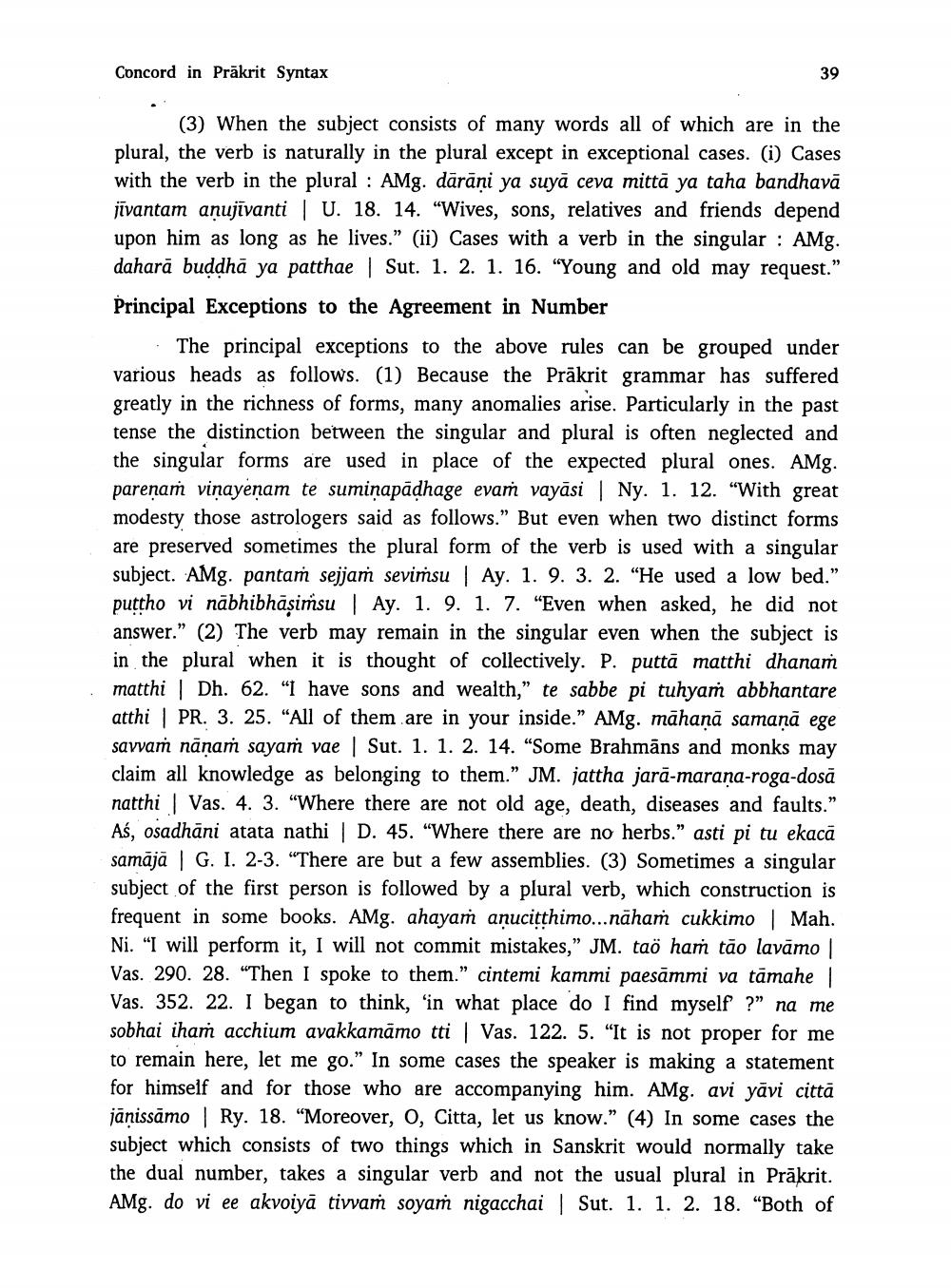________________
Concord in Prākrit Syntax
39
(3) When the subject consists of many words all of which are in the plural, the verb is naturally in the plural except in exceptional cases. (i) Cases with the verb in the plural : AMg. dārāni ya suyā ceva mittā ya taha bandhavā jīvantam anujīvanti | U. 18. 14. “Wives, sons, relatives and friends depend upon him as long as he lives.” (ii) Cases with a verb in the singular : AMg. daharā buddhā ya patthae | Sut. 1. 2. 1. 16. “Young and old may request."
Principal Exceptions to the Agreement in Number
The principal exceptions to the above rules can be grouped under various heads as follows. (1) Because the Prākrit grammar has suffered greatly in the richness of forms, many anomalies arise. Particularly in the past tense the distinction between the singular and plural is often neglected and the singular forms are used in place of the expected plural ones. AMg. parenam vinayenam te suminapādhage evam vayāsi | Ny. 1. 12. "With great modesty those astrologers said as follows.” But even when two distinct forms are preserved sometimes the plural form of the verb is used with a singular subject. AMg. pantam sejjam sevimsu | Ay. 1. 9. 3. 2. "He used a low bed." puttho vi nābhibhāşissu | Ay. 1. 9. 1. 7. "Even when asked, he did not answer." (2) The verb may remain in the singular even when the subject is in the plural when it is thought of collectively. P. puttā matthi dhanam matthi Dh. 62. “I have sons and wealth," te sabbe pi tuhyam abbhantare atthi | PR. 3. 25. "All of them are in your inside.” AMg. māhanā samanā ege savvam nānam sayam vae | Sut. 1. 1. 2. 14. “Some Brahmāns and monks may claim all knowledge as belonging to them." JM. jattha jara-marana-roga-dosā natthi | Vas. 4. 3. "Where there are not old age, death, diseases and faults." Aś, osadhāni atata nathi | D. 45. "Where there are no herbs.” asti pi tu ekacā samājā G. I. 2-3. "There are but a few assemblies. (3) Sometimes a singular subject of the first person is followed by a plural verb, which construction is frequent in some books. AMg. ahayam anucitthimo...näham cukkimo | Mah. Ni. "I will perform it, I will not commit mistakes," JM. taö ham tão lavāmo Vas. 290. 28. "Then I spoke to them." cintemi kammi paesāmmi va tāmahe Vas. 352. 22. I began to think, 'in what place do I find myself ?" n sobhai ihaṁ acchium avakkamāmo tti | Vas. 122. 5. “It is not proper for me to remain here, let me go." In some cases the speaker is making a statement for himself and for those who are accompanying him. Amg. avi yāvi cittā jānissāmo | Ry. 18. “Moreover, O, Citta, let us know.” (4) In some cases the subject which consists of two things which in Sanskrit would normally take the dual number, takes a singular verb and not the usual plural in Prākrit. AMg. do vi ee akvoiyā tivvam soyam nigacchai | Sut. 1. 1. 2. 18. “Both of




